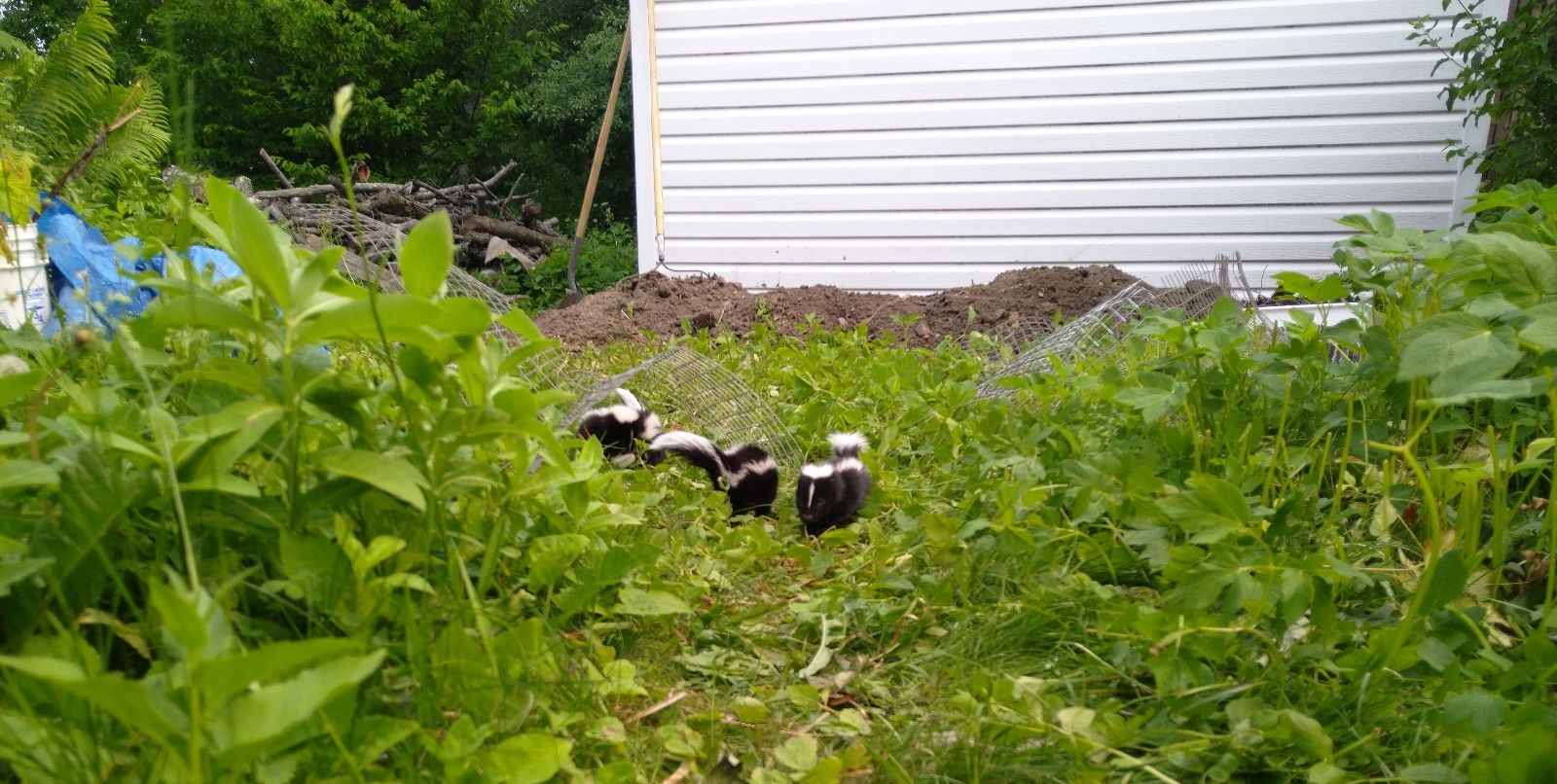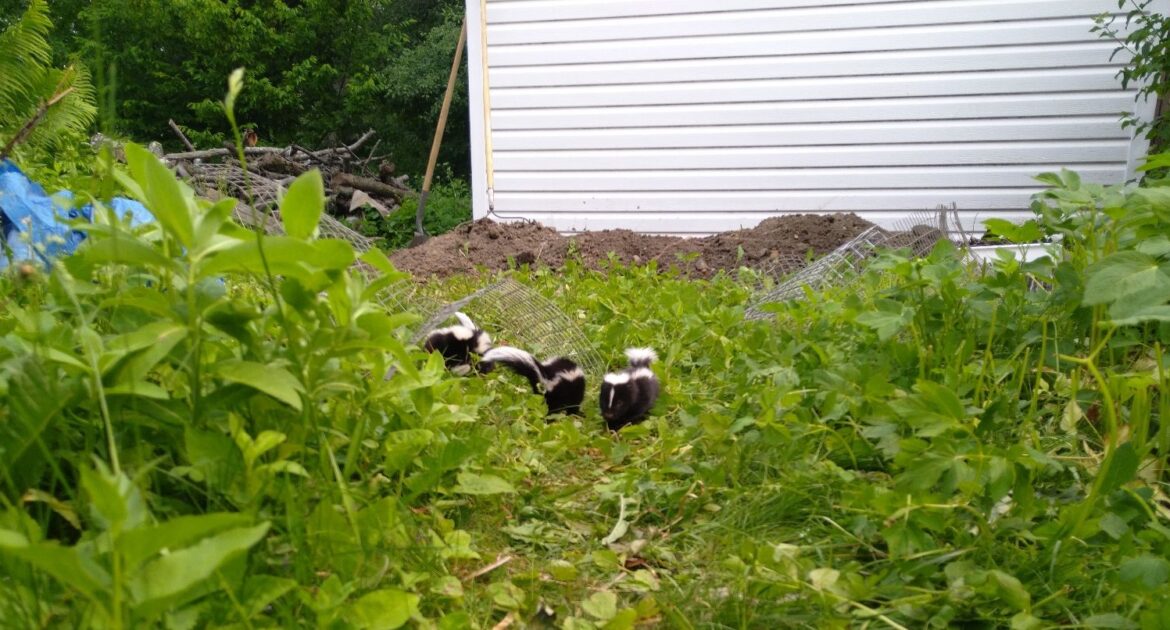Skunks in garden spaces are a common concern for many homeowners, especially in areas like Denver, where backyards and green areas are often an extension of the home. If you’ve been noticing holes in your lawn, overturned soil, or faint traces of that signature scent, you’re likely wondering why skunks are attracted to your garden in the first place. The short answer? Food, shelter, and safety.
Below, we’ll explore the primary reasons these animals are drawn to your garden, how to prevent them from settling in, and practical tips for keeping your yard skunk-free.
Why Skunks Are Attracted
Skunks are drawn to your garden for three main reasons: food, shelter, and accessibility. For suburban and urban areas like Denver, these factors often go hand-in-hand with how we design and maintain our outdoor spaces.
- Abundant Food Sources
The primary reason skunks visit gardens is to forage for food. These opportunistic feeders have a varied diet, which makes your garden an all-you-can-eat buffet. Common attractions include:
-
- Grubs and Larvae: Skunks love digging for grubs and beetle larvae, especially when the soil is soft after rain. These are rich protein sources for them.
- Fruits and Vegetables: If you have a vegetable patch or fruit trees, skunks might snack on tomatoes, berries, or fallen fruits.
- Pet Food and Compost: Leaving pet food outside or having an unsecured compost pile can also invite skunks.
- Birdseed Spills: Spilled seed from bird feeders is another easy snack.
Solution Tip: Keep gardens clean of leftover produce, spilled birdseed, and any outdoor trash. Cover compost piles and place pet food indoors to minimize temptations.
- Cozy Shelter
Skunks are excellent diggers, and they seek safe, dark places to create dens. These adaptable animals often find refuge under:
-
- Decks
- Sheds
- Porches
- Woodpiles
The structure and accessibility of these areas make them perfect for nesting, especially during the breeding season from spring through early summer.
Solution Tip: Inspect these areas of your property for signs of burrowing and consider sealing gaps with heavy-gauge steel mesh or other durable materials as a preventive measure.
- Accessibility
Once skunks discover food and shelter on your property, convenience ensures they stick around. Skunks are creatures of habit, and if your garden becomes part of their nightly forage route, they’re not likely to leave on their own.
Solution Tip: Install motion-activated lights or sprinklers. Skunks are shy creatures, and sudden movements or sounds are often enough to deter them.
Garden Skunk Prevention
Now that we’ve identified why skunks are drawn to your garden, it’s essential to focus on prevention strategies. Many of these solutions are straightforward and effective.
Seal Off Potential Dens
Before any skunks make your property their home, examine and secure potential hiding spots such as:
- Crawl spaces
- Decks and porches
- Openings under sheds
Use durable materials like heavy-gauge wire mesh to seal off these areas, burying the mesh at least 12 inches deep to prevent digging.
Eliminate Food Attractants
Make your garden less appealing by reducing the food sources available to skunks:
- Harvest fruits and vegetables promptly.
- Store trash bins with tight-fitting lids.
- Regularly rake and remove any dropped fruits or nuts.
- Use rodent-proof bird feeders to avoid attracting skunks with spilled birdseed.
Maintain Your Lawn
Keeping your lawn well-maintained can reduce its appeal. Regularly aerate your soil to disrupt grub breeding and consider applying natural repellents, like cayenne pepper or garlic sprays.
Timing Is Everything
Acting before skunks establish themselves is the key to successful prevention. If you detect early signs of activity like digging or tracks, address them promptly.
Skunks in Garden Spaces
Dealing with skunks in garden environments requires a mix of awareness and action. Skunks are nocturnal creatures, meaning they’re most active at night. If you’ve noticed overturned soil or small, shallow holes, these are clear signs of their feeding habits. However, it’s crucial to address the issue humanely while ensuring no harm comes to the skunks or your property.
Signs of Skunks in Your Garden
Some common signs include:
- Small, circular holes in lawns or flower beds.
- Strong, noticeable odor, even if they haven’t sprayed recently.
- Tracks with five toes and claw marks.
- Uneven or dug-up patches near the base of decks or sheds.
What Not to Do
- Avoid Using Poison: Not only is it inhumane, but it’s also illegal in many areas, including Denver.
- Don’t Attempt DIY Removal: Interacting with wildlife without proper experience can lead to unnecessary risks and harm to both you and the animals.
Instead, consider professional help if the problem persists. At Skedaddle, we specialize in humane approaches that ensure both your safety and the well-being of the animals involved.
Keep Skunks Out Permanently
Once skunks are gone, make it difficult for them to return by taking additional steps:
- Add heavy screens around vulnerable areas.
- Deodorize the space to remove lingering scents that can attract others.
- Maintain your property to minimize hiding spots.
Skunks in Denver Gardens
Denver’s natural landscape and urban gardens provide a lush environment for wildlife. With places like Washington Park and Cheesman Park offering green spaces for relaxation and recreational activities, it’s no surprise that neighborhoods surrounding these areas also attract wildlife, including skunks. While we absolutely encourage enjoying the city’s natural beauty, it’s equally important to balance this coexistence by keeping wildlife out of our home spaces.
Why You Need Professional Skunk Removal
Encountering skunks in your yard or near your home can pose various challenges, from unpleasant odors to potential health risks. Skunks are known to carry diseases such as rabies, and their defensive spray can linger on surfaces and in the air for days, making it difficult to restore comfort to your home environment. Attempting to remove skunks on your own can be risky, as improper handling may provoke these animals, leading to unwanted spraying or harm to both you and the skunk.
- Professional skunk removal services provide safe and effective solutions tailored to your needs.
- Experts handle skunks humanely, minimizing stress to the animal and damage to your property.
- Preventative measures are implemented to reduce future infestations.
- Entry points around your home or garden are identified and sealed.
Choosing professional removal not only ensures the humane treatment of wildlife but also prioritizes the safety and well-being of your family and pets. Working with experienced professionals gives you peace of mind while fostering a balanced coexistence with Denver’s vibrant urban wildlife.
Call Us for Reliable Help
When it comes to resolving skunk issues, prevention is your first line of defense. But if you’ve already spotted signs of activity or need assistance securing your property, our team at Skedaddle is here to help. We’re committed to humane wildlife control solutions that allow you to enjoy your garden without interruptions.
Don’t wait for the digging and odors to get worse. Contact us today to protect your garden and reclaim your outdoor space!




